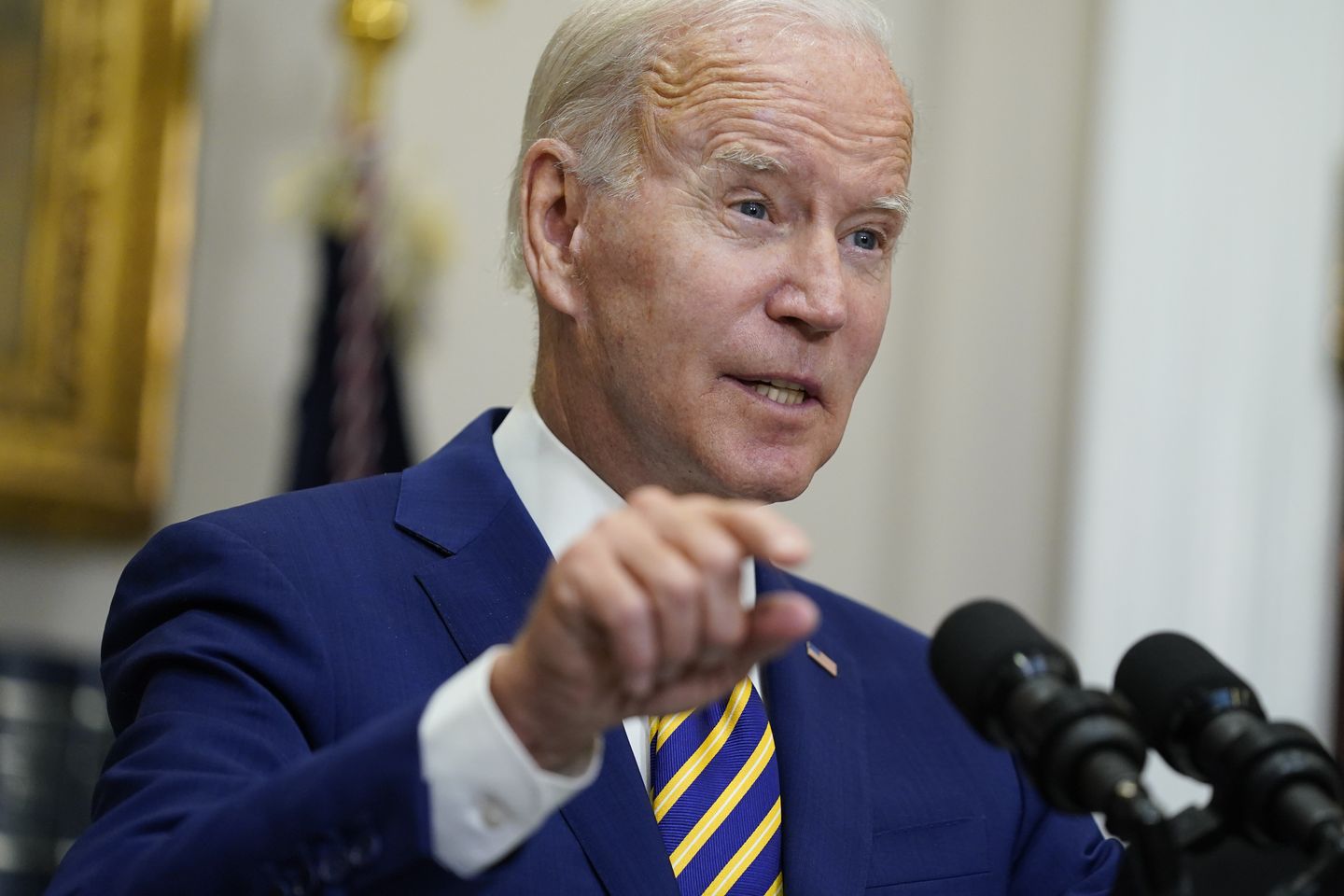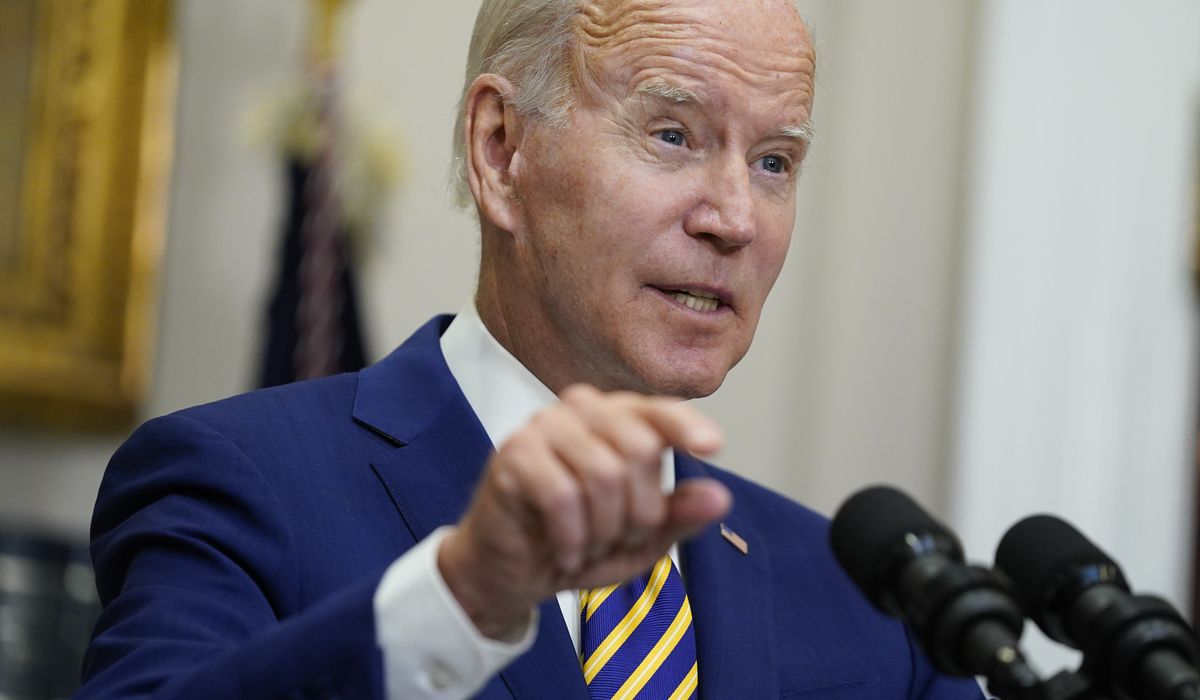

The Biden administration on Wednesday inched closer to restarting a controversial nuclear deal with Iran, brushing aside stark warnings from key American ally Israel and sidestepping mounting evidence that Tehran and its proxies have not moderated their behavior on other fronts and remain intent on targeting U.S. troops, officials, allies and interests.
The U.S. on Wednesday delivered a written response to Iran as the two sides wrangle over the details of a proposal to revive the Obama-era Joint Comprehensive Plan of Action (JCPOA), a 2015 pact that limited Iran’s nuclear program in exchange for economic sanctions relief. President Trump repudiated the deal in 2018, re-imposing harsh economic sanctions and Tehran has responded with a string of moves to boost its suspect nuclear activities that its critics say put it ever closer to getting a nuclear bomb.
The latest proposal was put forward by the European Union and billed as the “final” draft of the agreement, though the written responses from both Tehran and Washington suggest that negotiations will continue.
A deal, while seemingly closer than at any point in President Biden’s tenure, still hasn’t reached the finish line despite Iran reportedly dropping several of its most problematic demands.
“We are closer now than we were even just a couple of weeks ago because Iran made a decision to make some concessions,” said White House National Security Council spokesman John Kirby.
One of those concessions saw Iran drop its demand that the U.S. lift its designation of Iran’s Islamic Revolutionary Guard Corps (IRGC) as a “foreign terrorist organization.” That designation was put in place in April 2019 under Mr. Trump, and was the first time the designation was placed on a recognized nation-state’s official military force.
The U.S. refused to entertain such a move, which would have been impossible to justify politically as the IRGC and its affiliates continue trying to target Americans both at home and abroad and work with allies across the Middle East hostile to U.S. interests.
The State Department’s written response Wednesday came just hours after U.S. airstrikes targeted facilities in Syria used by extremist militias linked directly to the IRGC. Those strikes in Deir ez-Zor, Syria, were in direct response to a rocket attack last week against American troops stationed in northeastern Syria, Pentagon officials said. That attack, and the U.S. strike late Tuesday evening, represent the latest back-and-forth in what is now a years-long conflict between Iranian proxies and the American military.
“Today’s strikes were necessary to protect and defend U.S. personnel. The United States took proportionate, deliberate action intended to limit the risk of escalation and minimize the risk of casualties,” U.S. Central Command spokesman Col. Joe Buccino said in a statement.
“The president gave the direction for these strikes pursuant to his Article II authority to protect and defend U.S. personnel by disrupting or deterring attacks by Iran-backed groups,” he said. “The United States does not seek conflict, but will continue to take necessary measures to protect and defend our people.”
For its part, Iran denied any involvement with last week’s rocket attack aimed at U.S. troops and said any fault lies with America for keeping troops in Syria.
“The continued presence of American troops in parts of Syria is against international laws and violates the national sovereignty of this country and is considered an occupation,” Iranian Foreign Ministry spokesman Naser Kanaani said in a statement to Newsweek. “And on this basis, they should leave Syria immediately and stop plundering the country’s oil resources and grains.”
Less than a year after the Trump administration listed the IRGC as a terrorist group, an American airstrike at the Baghdad international airport killed the IRGC’s leader, Iranian Gen. Qassem Soleimani, and brought the two nations to the brink of war.
Since then, the IRGC has sought revenge for Soleimani’s death. Those efforts have even extended to American soil.
Earlier this month, the Justice Department brought charges against an IRGC member for allegedly seeking to pay for the assassination of former White House National Security Adviser John Bolton, an outspoken Iran hawk. Former Secretary of State Mike Pompeo also reportedly was targeted in that plot.
Neither last week’s rocket attack on U.S. troops nor the assassination plots against Mr. Bolton and Mr. Pompeo has derailed the administration’s effort to revive the JCPOA. Critics say it’s astonishing that the talks did not collapse long ago in the face of direct threats to American lives.
‘The red line’
Other JCPOA signatories, including China, Russia and leading U.S. allies in Western Europe, appear willing to take the deal now on the table, Mr. Biden is also facing growing pressure from a key ally, Israel, which has long opposed any deal with the Islamic regime.
Israeli Prime Minister Yair Lapid said this week that the U.S. and other signatories to the JCPOA should have stuck by their position that the most recent draft text would be the final one. Continuing to negotiate, he said, emboldens Iran to make more demands.
“The countries of the West draw a red line, the Iranians ignore it, and the red line moves,” Mr. Lapid told reporters in Jerusalem.
But Mr. Biden has repeatedly said that it is better to put a fence around Iran’s nuclear deals and then deal with Tehran’s other problems rather than let all diplomacy with Iran collapse. His supporters say the dangers posed by Iran should add even more urgency to the diplomatic push, which they say represents the best chance to help keep the world’s most dangerous weapons out of a hostile regime’s hands.
“Iran is a malevolent actor. They support terrorism. They target Americans. This isn’t [an] argument against the nuclear deal. It’s an argument FOR the deal,” Sen. Chris Murphy, Connecticut Democrat, wrote in a Twitter post Wednesday. “Why would we choose to pursue a policy that makes a nation as dangerous as Iran a nuclear weapons power?”
Even if the U.S. strikes a new deal with Iran, the long-term future of any agreement is far from certain. Key figures in the GOP are already promising that any new nuclear deal will be undone by a future Republican president.
“I intend to systematically fight the implementation of this catastrophic deal, and will work with my colleagues to ensure that it is blocked and eventually reversed in January 2025,” said Sen. Ted Cruz, Texas Republican.
The initial JCPOA was signed in 2015, but Mr. Trump pulled the U.S. out of the deal three years later. Iran has sought assurances that any new deal will be bound by law and that future Republican presidents will be unable to scrap it.
The administration, however, cannot offer such assurances. Such a guarantee would require that the deal be approved by a two-thirds vote in the U.S. Senate, a virtual impossibility given the current political makeup of the chamber.
State Department spokesman Ned Price said Wednesday declined to get into the details of the talks, but insisted again the Biden administration is open to a deal if Iran meets its terms, and that the diplomatic ball is in Tehran’s court.
“If Iran is prepared to fully implement its commitments under the 2015 deal, then we’re prepared to do the same,” he said. “This negotiation at times has languished for months upon months on account of Iran.”
But it’s also unclear exactly how close an agreement might be. Iran had reportedly backed away from its demand that the International Atomic Energy Agency permanently close an investigation into undisclosed nuclear material at multiple sites across the country.
But Seyed Mohammad Marandi, an Iranian adviser to the ongoing multilateral negotiations, said on Twitter this week that “no deal will be implemented before the IAEA Board of Directors PERMANENTLY closes the false accusations file” against Iran.
• This article is based in part on wire-service reports.
